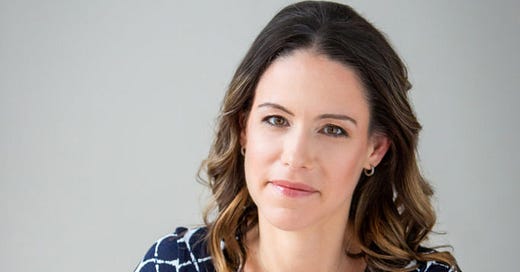How to Support LGBTQ Parent Families
An interview with Abbie Goldberg about what families and schools can do to be more inclusive.
In honor of Pride month, I’m excited today to be interviewing Abbie Goldberg, a psychologist at Clark University, whose research focuses on parenthood, relationship quality, and well-being in diverse families, including adoptive parent families and LGBTQ parent families.
I reached out to Dr. Goldberg because I wanted to understand and share some of common misconceptions people have about diverse families as well as the ways in which these families are excluded and discriminated against. I also wanted to learn about the other kinds of challenges diverse families face that heteronormative and biological families do not and what families and schools can do to better support them.
I’d like to encourage comments today from parents and caregivers who have ever felt excluded or treated unfairly because of their gender identities, sexual orientations, or other differences. If you’re willing and interested, please share your experiences and requests with us.
Dr. Goldberg, could you first talk a bit about your background and what inspired you to dedicate your career to understanding and supporting LGBTQ families?
While doing my Ph.D. in clinical psychology, and working on research related to the transition to parenthood for heterosexual cisgender couples, I realized that there had not been a single study exploring this key life transition for same-sex couples. My dissertation explored the transition to parenthood for lesbian couples using donor insemination to become pregnant.
On a personal level, I understood the importance of acknowledging, rendering visible, and exploring the experiences of marginalized family forms. I spent part of my childhood in a queer parent family, and it was important to me to do work with and for families who have rarely been centered in research.
What are some of the biggest struggles that LGBTQ parents face today when it comes to raising kids? What issues or experiences do you hear the most about from the families you talk to?
Many of the challenges I hear about are challenges that most parents face: navigating all of the unexpected challenges and/or surprises that parenting brings, including children’s unique needs and challenges (e.g., learning needs), navigating the transitions of childhood (new schools, puberty), and so on. But they are doing this against a backdrop of potential discrimination or at least lack of understanding of their families. There are numerous situations that involve additional emotional and sometimes physical labor related to being an LGBTQ-parent family: choosing schools, camps, and extracurriculars with an eye towards inclusion and acceptance, introducing your family to new teachers, navigating exclusion in school settings, figuring out how much to advocate for your children and how much space to leave for them to figure things out for themselves, and more.
Plus, right now, families are facing intense scrutiny and politicization of their identities at the national and societal levels, which creates additional stress.
What can heteronormative parents do better in terms of supporting LGBTQ parents in their communities?
Real allyship doesn’t just mean tolerance or acceptance. It means speaking up before there is a problem, or maybe even a known LGBTQ parent at a given school or in your neighborhood. It includes speaking out against book bans (it’s important for all children to learn about diverse identities and families), advocating for curricular inclusion, getting parents together for a local or city Pride parade, and so on.
What are some ways in which schools sometimes inadvertently exclude or discriminate against LGBTQ families? Are there any simple changes they could make to be more inclusive?
Schools often make assumptions about the kinds of families that are represented in their communities based on a lack of experience with certain types of families (e.g., they’ve never had a gay dad family so they do not think about how Mother’s Day celebrations might be problematic for some families, or seem to communicate certain values). Likewise, they may make assumptions about parents’ sexual orientations, gender identities, or relationship statuses because of a lack of familiarity and an unconscious centering of heterosexual or heteronormative experiences.
Simple changes require a rethinking of assumptions. For example:
What options do they give for parent gender on school forms? Consider write-in options, like “parent 1, parent 2, parent 3” — not “mother, father.”
Consider the images that appear on your website and school materials. What family structures appear? Consider inclusion of families that are multiracial and have diverse gender presentations.
Consider curricula and assignments. What assumptions might be embedded in them about how families came to be, or who is in a family? For example, assignments often assume that children have been with families since birth — not true for adoptive families. Thus, early photo / memory assignments may not be appropriate. Likewise, parents are not necessarily genetically related to their children. Biology does not a family make.
Your free website, Teach All Families, which you created to help make schools more inclusive of LGBTQ+ parent and other diverse families, is amazing. It includes resources, such as short handouts, for teachers, administrators, and LGBTQ+ parents. Can you share a bit about the project — how it came to be, what it aims to do, and how schools can use it?
I had two Spencer grants to examine family-school partnerships and school experiences of LGBTQ parent families. Then, they offered a unique funding opportunity to those grant recipients who wished to create translational products with their work, which I eagerly applied for and was lucky enough to receive, along with others. I used the funding to create the materials and website with the goal of using all that I had learned from hundreds of families over many years to support both parents and schools to better support families.
Since its implementation, I have had the chance to work with teachers, school administrators, and others with the goal of introducing them to the materials, strategizing with them about how to use and adapt them, and even working with select groups, such as a cohort of Montessori teachers, over a period of months to successfully implement various components and troubleshoot issues — e.g., dealing with resistance from other parents.
What are the best ways to manage resistance from others?
Here’s the general guidance I offer: It is always a good idea to remind parents and community members of shared values and principles, and guide them to see how [things like] books, language, visuals, etc. that depict all families are consistent with school values of inclusion and equity. There’s no “special treatment” — and usually there’s not even really issues of being “taught” about sexuality or gender. Rather, the school is trying to uphold its values of ensuring that each child feels safe and able to reach their fullest potential, as well as ensuring that all families are able to participate equally.
Parents may be upset with changes — e.g., why no more Mother’s Day celebration? — but can be reminded that schools and others change, evolve, and do things differently as they learn, as their families and communities change, and so on. And just because a school does or doesn’t do X doesn’t mean that families can’t do X on their own.
Are there any common misconceptions about LGBTQ parents, or their kids, that you would like to correct?
LGBTQ parents, when encouraged, are some of the most involved parents in schools. Failing to treat them with respect and appreciation means missing out on important and valuable contributions as well as strong parent-school partnerships — which we know benefit kids. And isn’t it all about the kids?








My daughter is a behavior specialist who works with lots of different families. I sent her the link to Abbie’s website. I appreciate the encouragement to step outside our assumptions and preconceived ideas.
Yes, thank you for sharing the resources. I’ll be sure to share with my kids’ school’s PTA Equity Team.